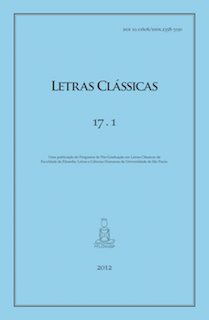Unanimity and dialogue: argumentative purpose of late-antique synodical proceedings and hagiographies
DOI:
https://doi.org/10.11606/issn.2358-3150.v17i1p84-96Keywords:
Oralidade, oratória tardo-antiga, epistolografia, circulação de protocolos sinodais, administração imperial romanaAbstract
I analyse summonses mentioned in letters and proceedings circulated by the majoritarian faction of the Christian leaders gathered in Ephesus in A.D. 431, highlighting its layers of meaning and the aspects of verbal and non-verbal communication to which they refer. I contrast them with the mutual accusations and sanctions, mentioned in letters and pamphlets by imperial officials and faction leaders, which corroborate or weaken the representation of consensus by means of written documents. Thus, I problematise the narrative which purports to meet the imperial injunctions of discussions about religious issues relying on the pattern set at Nicaea, performed in unanimity and dialogue, and secured imperial endorsement of the decisions. This literary and historical analysis of the argumentative purpose of late-antique synodical proceedings corroborates that also in the more extensively documented meetings of ecclesiastic leaders, the representation of the events remains partial, and they cannot be taken as typical representatives of a wider phenomenon. Analysing the reliability of the reports of popular and monastic demonstrations in Constantinople, especially the references to non-verbal communication, contributes to the study of the early circulation of synodical acts.
Downloads
Downloads
Published
Issue
Section
License
Autores que publicam nesta revista concordam com os seguintes termos:
- Autores mantém os direitos autorais e concedem à revista o direito de primeira publicação, com o trabalho licenciado simultaneamente sob uma Licença Creative Commons Attribution permitindo o compartilhamento do trabalho com reconhecimento da autoria do trabalho e publicação inicial nesta revista.
- Autores têm autorização para assumir contratos adicionais separadamente, para distribuição não-exclusiva da versão do trabalho publicada nesta revista (ex.: publicar em repositório institucional ou como capítulo de livro), com reconhecimento de autoria e publicação inicial nesta revista.
- Autores têm permissão e são estimulados a publicar e distribuir seu trabalho online (ex.: em repositórios institucionais ou na sua página pessoal) a qualquer ponto antes ou durante o processo editorial, já que isso pode gerar alterações produtivas, bem como aumentar o impacto e a citação do trabalho publicado (Veja O Efeito do Acesso Livre).


